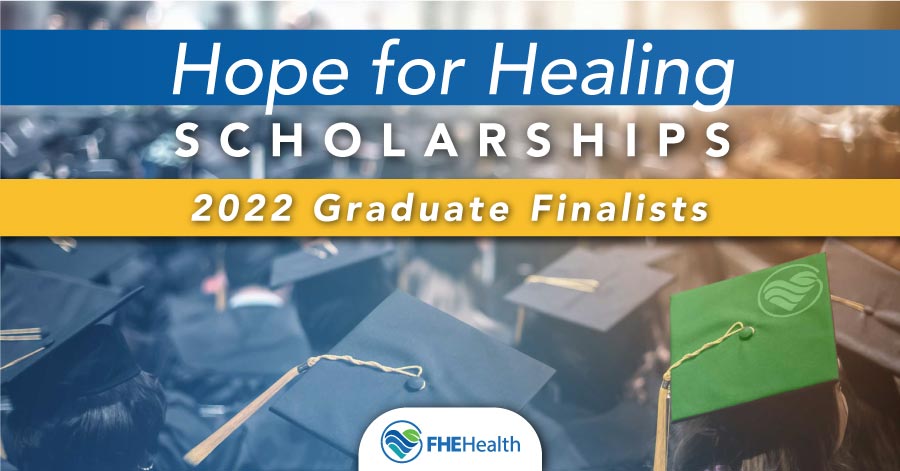
After another very competitive round of applications, we are excited to introduce you to the five graduate finalists for the 2022 “Hope for Healing Scholarship.” (Meet the undergraduate finalists here.)
Each year, our scholarship committee meets to decide who, from among hundreds of applicants nationwide, shows the most promise in the field of mental and behavioral health and is most deserving of a $5000 grant to support their studies. This is the third year that one graduate and one undergraduate student will receive a $5000 scholarship from FHE Health.
We invite you to get better acquainted with each of these outstanding finalists below and check back in on March 14. That is when we’ll announce who, from among these five impressive people, will be the graduate recipient of the 2022 Hope for Healing Scholarship.
Diverse Backgrounds, Studies, and Vocations in Mental Health
This year’s finalists represent a diverse range of backgrounds, studies, and vocations in mental health. We invite you to get better acquainted with them here:
Amy Burrell, a retired State Parole Agent and Chief Petty Officer, USCG, is pursuing a graduate degree in counseling at Post University. As a State Parole Agent with the Commonwealth of Pennsylvania, Burrell oversaw the “mental health caseload.” This meant working with area agencies to reduce rearrests and recidivism of mentally ill offenders, by helping them achieve better treatment outcomes and connecting them with community services. In the process, Burrell spent many off-duty hours learning about mental health and addiction issues and gaining insight and perspective from experts in the field about how to serve this population. Thanks to her work and influence, her home state of Pennsylvania has now trained more agents who specialize in mental health and now requires all agents to take a mental health first aid course. After she graduates, Burrell wants to serve first responders with mental health needs. She also wants to volunteer as a counselor in high-stress incidents such as shootings and mass casualty events.
Peter Chindavong is pursuing a medical degree at Alabama College of Osteopathic Medicine. Displaced by civil war in Laos in 1975, Chindavong’s family spent four years in refugee camps before finally resettling in the U.S.. In college, Chindavong majored in biochemistry and minored in psychology. He also volunteered on campus as an EMR responding to drug and alcohol overdoses. After college, he joined a neuropsychiatric research laboratory at Massachusetts General Hospital, where he studied mental disorders on a molecular level and how drug therapies for these conditions are developed. Later, as a Fulbright English instructor in Laos, Chindavong was a volunteer Lao-English-French interpreter for an American physician. His experiences have ignited a desire to serve underserved populations and destigmatize mental illness in immigrant communities.
Maria Isabel Ramos Martinez is earning a Ph.D. in Clinical Psychology at the University of Texas Rio Grande Valley. Her goal is to become a professor and a psychologist who educates and serves under-served, Spanish-speaking communities. In her essay, she named “racial injustice, cultural insensitivity, and inaccessibility to needed resources” as top reasons why she chose this vocation. She also pointed to the birth of her son and her experience of motherhood as further inspiration to pursue these goals. Ramos Martinez is a survivor of intimate partner violence (IPV) and is conducting research into ways to reduce IPV, the mental health implications for victims, and how to support survivors like herself through empowerment.
John Rhodes, a master’s student at Adams State University, is studying to become a clinical mental health counselor. After service in the U.S. Navy and an honorable discharge, Rhodes “came home a different person.” The trauma of what he had seen and experienced while in the military followed him around in the form of flashbacks, nightmares, and severe anxiety and depression. After multiple suicide attempts, Rhodes found the help he needed through friends and fellow veterans. It started with a diagnosis of post-traumatic stress disorder (PTSD) and corresponding treatment. Rhodes began to volunteer his time serving veterans with the same diagnosis. That gave him a new sense of purpose and vocation. Today his goal is to continue serving veterans who are suffering from mental health disorders like PTSD.
Henry Vinyard, a combat veteran, is pursuing a Psy.D. in clinical psychology and a M.B.A. at Widener University. Vinyard’s aspiration is to become a clinical psychologist and help people with addiction and mental illness. He wants to use his M.B.A. degree to earn a living as a consultant and an executive coach, so that he can also offer pro bono services to those in need. Since July 2021, Vinyard has been providing individual and group therapy to veterans with a wide variety of inpatient mental health needs at the Corporal M.J. Crescenz VA Medical Center in Philadelphia. He has also interned at two correctional institutions, the Patuxent Institution and the Maryland Correctional Institution for Women, where he served inmates with often severe mental illness. One reason Vinyard is passionate about this work is that he has personally seen and witnessed how addiction and mental illness “affect people from all walks of life and every socioeconomic status.”
Want to know who will become the graduate recipient of the 2022 Hope for Healing Scholarship? Tune in on March 14 for our announcement.






